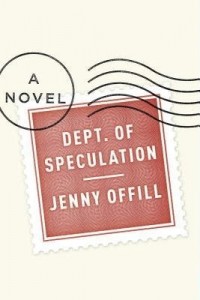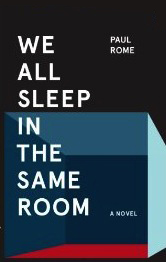I Read Scarecrone in the Bath
I read Scarecrone by Melissa Broder in the bath. Originally, I bought every copy of Scarecrone from Adam Robinson but then I sold them all back to him for the same price, except one, which I kept. That is the copy of Scarecrone I read in the bath.
I had a notebook and pen by the bath because I knew it would be an experience that I would want to express something about, even though I’m uneasy with experiences and expression.
Earlier, I’d read an interview of Melissa Broder by Shane Jones in The Believer about food and food rituals. The interview answers are very honest and detailed. I became upset as I read it because it put me in touch with a kind of radical normalcy in my thoughts and behaviors around food and my body. I began to wonder, as I’ve wondered before, if that normalcy has to do with how many hours & hours I spent in the bathtub as a child and teen, around my own naked body but not confronted with it. As a child and teen, in the bathtub, I usually either read, in which case I saw my headless naked body in the lower periphery, or I did things to make my body feel or do things, in which case I guess I closed my eyes or saw my body through unusual filters.
(I don’t know how to describe any of this in non-dualist ways, especially from the bath point of view since–unlike in the mirror where you see everything or mostly your face– in the bath you see your body but not your head where your brain is, so that the body really seems like something apart.)
I thought about how I have no discipline about food–no habits–but I do have a modicum of self-control. A lot of the interview was about bingeing, which I’ve never done, and which must require even more discipline than purging or limiting food. Bingeing must require a kind of vision, or drive, that will only work via an extreme amount of discipline that I’ll never have.
I thought about how uninterested in purity I am, especially when it comes to food and the body, which is part of what upset me about the interview. I have been slow to read Scarecrone in part because it seems pure and honest, and I am uncomfortable with purity and not very honest. Part of that dishonesty has probably led me throughout my life to deny the existence of any bad feelings about my body. Shame itself is so pure, or at least it’s predicated on the desire for purity. I am not honest about shame I might feel, or ways that I might wish I were pure or that something in the world were pure.
Still, I wanted to read Scarecrone in the bath. I thought something would happen to me if I did because I read reviews that said it is a book of spells, and I am most vulnerable to spells in the bath. I ran the water and realized it was much too hot. For the spell to work, I thought, maybe it would be better to sit naked on the cold toilet seat beside the bath but not get in, and read Scarecrone like that. Or maybe for it to work I should light candles and put them around the bath.
Does anyone want to talk about The Grand Budapest Hotel? I think there’s a case to be made it’s Wes Anderson’s best film.
Dept. of Speculation
 Dept. of Speculation
Dept. of Speculation
by Jenny Offill
Knopf, 2014
192 pages / $22.95 buy from Amazon
Rating: 3.5
When I read Michael J. Seidlinger’s list of indie lit for the year I was so excited that I stayed up until three AM all atwitter thinking about it, but for as excited as I am about the alt lit scene, the recent National Book Critics Awards finalists make it clear that the lit world at large lacks the same scope and enthusiasm.
The new Knopf book Dept. of Speculation by Jenny Offill is especially indicative of this endemic lack of innovation and the narrow definition of literary taste that seems to grip the big five publishers. READ MORE >
April 8th, 2014 / 12:00 pm
25 Pieces Of Writing Advice To End All Writing Advice

Most writing advice comes off as watered down and lacking both bark and bite. I’m not sure exactly why, but I think it has something to do with the writer being hesitant to have his or her name attached to something potentially offensive. Very few seem to crave the public attention of being a curmudgeon spitting on the idealistic novice.
I’ve spent the last month contacting authors (both major house and indie; critically acclaimed and up-and-coming; big names and small; cock wavers and VIDA junkies) and a few influential editors, asking each to submit their most heartfelt, brutal, and honest writing advice they could think of. I promised to publish what they wrote anonymously. The following are the results.
We All Sleep in the Same Room by Paul Rome
 We All Sleep in the Same Room
We All Sleep in the Same Room
by Paul Rome
Rare Bird Books, November 2013
192 pages / $14 Buy from Amazon
In his debut novel, We All Sleep in the Same Room, Paul Rome achieves what even seasoned novelists often fail at: generating characters that feel real-to-life, situations that seem organic and natural, rather than the second-rate simulacra of bad fictions, and a cultivated style that is beautiful in its understated elegance — sculptural, even.
Much has been written lately on the ever-quickening Brooklyn lit scene, although there has probably never been a dearth of “Brooklyn novels” or “Brooklyn writers.” Rome’s first novel positions him as a new voice with an old soul, a writer more akin to Paul Auster both stylistically and thematically than to his peers, like Tao Lin and Adele Waldman, whose Taipei and The Love Affairs of Nathaniel P., respectively, chronicle the lives of young, writerly Brooklyners as they negotiate the perilous hinterlands of relationships — both to others and to the self. Rome echoes Auster in his clean, well-lighted prose, and Rome’s conjuries of the city, with its infinite chance happenings and endless sense of mystery, is likewise definitely Austerian. But whereas Lin and Waldman direct their foci towards the realm of listless twenty-somethings, Rome explores the vagaries and varieties of middle-age. Despite its being set in the Fall of 2005, Rome’s New York is the New York of old, and his subjects are similarly different than those of his contemporaries.
With surprisingly intimate psychological acumen, he dissects, scrutinizes, and mournfully portrays Tom’s and Raina’s failing (and ultimately failed) relationship. Tom is a union lawyer, a hard-working professional dedicated deeply to, and personally invested in, the ideals of justice and equality that his firm ostensibly seeks to uphold. Within the novel’s overall context of loss, the presence of an idealistic politics on the part of Tom makes the withering of it all feel especially concussive.
The novel is characterized by a powerful sense of the teleological: every absence-haunted sentence — each of them exercises in the potency of minimalism done right — seems to foreshadow intensely and evoke powerfully the fact that the novel will have a devastating and inevitable end-point. It seems so frequently to be raining or snowing in Rome’s New York. We All Sleep in the Same Room is a very melancholy work. We are drawn inexorably towards the emotional black hole at the novel’s core; we are sucked beyond its event horizon with every painfully wrong move on the part of Tom. Jessie, a young and incredible eager young woman and a recent hire at the firm, is at the heart of Tom’s and Raina’s marital divide — sort of. Rather than coming across as a “manic pixie dream girl,” a young woman who is, like the young women in some of Philip Roth’s novels, a tabula rasa upon which a disaffected and disenchanted older man can project his erotic obsessions onto, Jessie is truly “three-dimensional” and deeply human. Rome’s characters operate on a number of different registers, all of them faithfully drawn and vividly realized.
Rome’s style is lucid and elegant; he handles the issue of back-story — a pitfall for even the greatest of writers — with admirable élan. Like James Salter (Light Years, A Sport and a Pastime) and Richard Yates (A Special Providence, Revolutionary Road), Rome is interested in the internal, in the mysteries of selfhood, of past, of memory, and of regret. These he explores, like Salter and Yates before him, through the lens of a relationship dissolving and disintegrating as a result of the pressure put on the present by the protagonist’s past mistakes. And Rome’s authorial voice is astoundingly mature, his style effortlessly clean: lyrically restrained and “taut,” his prose reflects the mounting tension and anxiety that come to pervade the work as Tom’s domestic and professional life unravel. Rome’s narration exudes confidence and assurance, and has an ethos from the first line to the last — the kind of ethos that carries a novel and ultimately makes it one worth reading.
The novel is haunting and understated, with sublimated and shadowy pasts that re-emerge like phantoms. The persistence of past mistakes, the persistence of time, the inevitable forward-movement and forward-momentum towards the end of all good, or seemingly good, things: these are Rome’s real narrative interests, and he delves into them in thought-provoking and emotionally resonant ways. We All Sleep in the Same Room is a dirge for things lost, a New York novel of the old-school, and a powerful debut by a writer who has almost preternaturally insightful things to say about all that is.
***
Michael Abolafia lives in New York City. His writing has appeared in Sunlit, Supernatural Tales, the New York Daily News‘ online book blog, Page Views, and other venues.
April 7th, 2014 / 10:00 am
Made To Break by D. Foy
 Made To Break
Made To Break
by D. Foy
Two Dollar Radio, March 2014
242 pages / $16 Buy from Amazon or Two Dollar Radio
Friendship is a two-headed beast. As humans, our continuous need for interaction, communication, and companionship regularly clashes with fear of exposure, the sourness that comes from the inevitable accumulation of failures in life, and our proclivity toward pettiness when faced with frustrating situations. In Made To Break, author D. Foy explores the conflicting sides of amity as well as the unexplainable cohesive element that hides in the interstitial spaces between the good and the bad and ultimately holds friendships together.
Lucille wants to celebrate her new high-paying corporate job, so she decides to spend New Years’ Eve weekend drinking and getting high in a cabin in Lake Tahoe with Dinky, Andrew, Hickory, and Basil. When the five friends get there, there’s a dead caged bird filling Dinky’s family cabin with the smell of rot. Instead of taking it as a bad omen, the group starts talking about childhood pets and argue about who’s going to get ice. Dinky and Andrew end up having to leave the cabin despite that fact that weather forecasts warn of an impending flood. On their way to town, they crash their truck and Dinky is seriously injured. Broken and without ice, they finally encounter a strange man called Super who takes them back to the cabin. With the storm raging outside, no car, and the phone lines dead, the group turn to a game of Truth or Dare to help them pass the time until the sky clears and help can arrive. However, what starts as a game quickly transforms into a series of attacks, thinly veiled insults, and cruel accusations. Old wounds bleed again and new ones open up while weather conditions worsen and Dinky’s health deteriorates. Before the night is over, everyone will have to face, and question, themselves, death, and each other.
Nothing is what it seems to be in this narrative. There’s supposed to be a celebratory mood in the air, but hidden agendas, snarky comebacks, and the type of wittier-than-thou personalities that inevitably cause conflict whenever they’re put together give the novel a surprisingly oppressive and noirish atmosphere that it never shakes off. Andrew acts as narrator and slowly reveals his crush on Hickory and a romantic triangle between Dinky, Basil, and Lucille. With each revelation, a piece of each character is exposed, and they’re all flawed. While being imperfect is part of human nature, when flaws are exposed in public and boosted by vindictiveness, they become enlarged and serve only to inflame any situation and bring forth retaliation. Foy understands this, and so do his characters. However, knowing about it doesn’t stop them from repeatedly trying their best to eviscerate each other with words, fully aware of the fact that they’re using them as weapons and deriving a bizarre pleasure from it:
“There was that briefest moment of doubt where Basil and I considered exchanging our knives for guns or throwing the knives away. But really the doubt was feigned. We knew what would happen. The kill was just a dream. The sight of blood was enough. We were only after the blood. This of course was a perversion cultivated over time, like a taste for taboo food, monkey brain or mice. The satisfaction of knowing we’d wounded one another was more than sufficient. In fact, it had become for us a fix of sorts, why our hate for one another always equaled our need. Basil and I were Siamese twins parted only in flesh.”
April 7th, 2014 / 10:00 am
Sunday Service: Kenny Jakubas
Her Space Circle(s)
From our brief chronology of time it appears that first
he briefed his job about the current inadequacies
of forgetful behavior & lit some marijuana as he was talking
& got fired right then for speaking what words he thought were true.
It could be said he fell terribly for the roses that fell from the balcony
of her MySpace after that call. The new look of her page was like being in her.
Her space even smelled like roses & see here he scrolled forever one night, etc.,
because she had presence. Even I used to wonder specifically about spaces
& the matter that destroyed & created. Check this out.
If you look closely enough & back your eyes away from this screen
real quick you can see the trickled space of white between these words that
would allow rose petals to slowly drop between these sentences. & symbols
are space circles that can be galaxies too. That would be
a poem. This is what he saw: the absence of this Space dissolving into a million
empty catacombs. He wished upon roses built of code
because they were the only roses he would ever receive & they were
beautiful to him. This was no game that Called to Duty
it came back with a story about infinite disappearance, it was real
& empty at the same time, the same representation of bird and bee:
is there matter in the lost message to a girl from the woods?
Somewhere in space there must be this message bouncing between stars,
& after a long time the stars return with a typed story about a boy
with the world at the tips of his fingers who had brought the rose petals
that fell from the screen of her MySpace & presented them as proof
that she existed to him
then.
Bio: Kenny Jakubas came from the inside of a little mitten under a bridge in Michigan. He graduated with honors from Western Michigan University, where he received his BA in Creative Writing. While there, his poetry and prose appeared in the literary journal ‘The Laureate’. He currently has creative non-fiction forthcoming from ‘Niche’ lit mag. Kenny lives in Kalamazoo, MI with his son and will be attending Western Michigan University’s MFA program in the Fall of 2014.
Bald New World by Peter Tieryas Liu
 Bald New World
Bald New World
by Peter Tieryas Liu
Perfect Edge, May 2014
229 pages / $16.95 Pre-order from Amazon
Having been thrilled by the imagination in his short story collection, Watering Heaven, I was excited to see Peter Tieryas Liu was taking on a larger work: his new novel Bald New World. The play in the title on the canonical dystopian work by Huxley only further stimulated my appetite.
How would it be handled? Would it be playful? Would it be strange? Would it be dystopian? Yes, yes to all those things (other than the one that isn’t a yes/no question):
As the title suggests, everyone has mysteriously gone bald. One would hope that people would learn to live with baldness, since no one has any hair. However, we should all know human nature better than that by now. Superficial, vain, and capable of endless denial. There are riots, chaos. This goes hand in hand with the actual problems in the world: overpopulation, diminishing food supplies, wars over resources, and so on. Wig companies dominate the global economy.
As one would demand in a dystopian novel, life becomes even more hellish than it already is. Body modification, visits to the United States (though most of the book takes place in China) fraught with the almost certainty of being shot, North Korea kidnapping people from other countries to be slaves in forced labor camps, and more. The term ‘dystopian’ certainly fits.
Within all of this, we have Nick. Nick has spent his life trying to cut himself free from a horribly abusive family…trying to be free. Modernly, he’s a filmmaker:
His friend and employer, Larry, is the heir to the world’s most powerful wig corporation. He’s also somewhat of a fuckup.
However, something particularly strange is going on. Larry may be in over his head, caught up in a conspiracy with far-reaching and possibly deadly consequences. At the heart may be the very secret behind why everyone went bald. Of course, he pulls Nick in. Things wouldn’t be very interesting if he didn’t:
He laughed. “Maybe I’m being a touch melodramatic. Beautiful women always do that to me. Let’s give it one more shot. This new film I was mentioning. It’ll be the biggest ever.”
“Can you give more details?”
“At first, I thought maybe I’d do a documentary about my family. Or maybe I’d make it into a film about a rich family with an idiot son who squandered everything. Would that be too cliché? I don’t want to be that idiot,” he said. “I’m starting to settle on one idea.”
“What is it?”
“I’ve always wanted to do an epic about the Baldification. Maybe call it Bald New World. Do a film about the people in it. It’ll be massive. I guarantee you. This’ll be the film that everyone notices.”
“No one’s figured out what exactly happened yet.”
“That’s what the businesses would like people to think,” Larry said. “What if I told you people like my father knew exactly what happened?
“What do you mean?”
“Well—”
Behind us, one of the factories exploded, blowing the plates off the table and knocking us both back. A second factory blew up, the fire blasting against our faces. My ears were ringing and the smoke made everything hazy. I heard a third boom but couldn’t tell where it was from. Sirens were ringing.
April 4th, 2014 / 11:00 am
Cris Mazza Virtual Book Tour Stop

Cris Mazza stops at HTMLGIANT as part of her virtual book tour…
***
Cris Rants:
 I was prepared to sit here and rant about having to change my author photo to a more friendly, smiling image, certain that practically zero men ever get told they need a smiling photo (or to “look cute” as another writer wrote about being advised). This advice (and that I felt pressured to follow it) was particularly troubling this time, for this book: because the book is nonfiction, because part of it is about female sexual dysfunction, about not feeling sexy in a sex-hungry, sexiness-demanding world. The photo I had chosen, a selfie, showed the mood I thought the narrative conveyed.
I was prepared to sit here and rant about having to change my author photo to a more friendly, smiling image, certain that practically zero men ever get told they need a smiling photo (or to “look cute” as another writer wrote about being advised). This advice (and that I felt pressured to follow it) was particularly troubling this time, for this book: because the book is nonfiction, because part of it is about female sexual dysfunction, about not feeling sexy in a sex-hungry, sexiness-demanding world. The photo I had chosen, a selfie, showed the mood I thought the narrative conveyed.
 When the smiling photo was requested (not by my publisher), I didn’t have the time (and was very low on inclination) to create another photo, to “try” to smile for it without appearing conscious it had been requested. So I went back to the most recent photo I had where I was smiling (also containing my dog, the same dog, so not that long ago). Unfortunately, it was taken in the summer and I was wearing a tank top. I truly and firmly did not want to be showing skin in the author photo for this book.
When the smiling photo was requested (not by my publisher), I didn’t have the time (and was very low on inclination) to create another photo, to “try” to smile for it without appearing conscious it had been requested. So I went back to the most recent photo I had where I was smiling (also containing my dog, the same dog, so not that long ago). Unfortunately, it was taken in the summer and I was wearing a tank top. I truly and firmly did not want to be showing skin in the author photo for this book.
I’ve seen too many books by women recently where the author photo is beyond “you’re pretty when you smile.” From seductive to downright trampy, wearing a lacy slip or camisole, professionally made-up, professionally applied cleavage (if none was readily available). Why do we have to look ready for sex to have our books respected, or just read?
Did I say respected? I was pleased to be reviewed recently in an esteemed review vehicle, but I’d like to assume the header was not written by the reviewer, because the title completely trivializes the three books covered in the review. “On Losing It And Other Chick Stuff.” I can’t imagine a book by a man that reveals a lifetime of erectile dysfunction would have been devalued as though it was about boys snapping towels in the locker-room.
Ok, so I did start my rant. I was going to say I didn’t need to write it because before I did, Rae Bryant posted this:
I find it interesting when editors or presses promote an International Women’s Day when their aesthetic really only promotes women writers writing about sexy sex. Don’t get me wrong. I like the sexy sex in literary fiction when it’s done well and witty (toooo many times it’s not) but International Women’s Day really requires a sense for GENDER EXPLORATION, including sex in all its sexiness and dark and nasty. Just aren’t a whole lot of editors who really know what that is. A few who really do.
There also seems to be a collect of editors/publishers who publish the “sweetheart crowd.” Male run/fraternity like publications who have decided upon their “fraternity sweethearts.” These fraternity sweethearts must have the following attributes:
- DO NOT bitch about our maleness in any shape or form.
- You MUST entertain us by sexy words on page and more preferable, a willingness to perform your sexiness at readings and other such events.
- A constant sense of humor about your gender. If you get PMSey at any point in time, we reserve the right to oust you, our boy club friends will oust you and you’ll never again be on the fraternity sweetheart list. Blacklisted. Or Blackballed.
Of course no one’s going to name names, me included, but … over a drink somewhere, I’d love to hear the experiences that brought this out on a Friday afternoon. My little author photo misery might have to take a smaller role in a larger conversation.
***
Cris Mazza is the author of over 17 books, including Various Men Who Knew Us as Girls, Waterbaby, Trickle-Down Timeline, and Is It Sexual Harassment Yet? Her first novel, How to Leave a Country, won the PEN/Nelson Algren Award for book-length fiction. Mazza has co-edited three anthologies, including Men Undressed: Women Writers on the Male Sexual Experience. In addition to fiction, Mazza has authored collection of personal essays, Indigenous: Growing Up Californian. Currently living 50 miles west of Chicago, she is a professor in the Program for Writers at the University of Illinois at Chicago.

